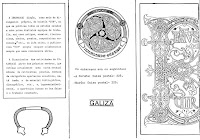Hereby you may find the scan of one of the first official flyers, and its translation from the original Galician text.
The Celtic Brotherhood is a cultural initiative that emerged in 1986 among a group of young Galician Celticists in order to cope with the mockery and the frivolous question of Celtic Galicia. The C.B. is lined up mainly by specialists, and fans aware of their true potential and limitations, and with much interest in what is its origin, its identity, its past and future of their people.
The C.B. does not allows any kind of pressure, and is not engaged in any sort of ideological party. The C.B. respects the diversity of its membership policy, but will not tolerate attempts to tamper or threaten its internal cohesion and functioning.
The C.B’s goal is to revitalize any cultural and social expression genuinely Galician, renovate and restore the traditions of Celtic Galicia, and, ultimately, strengthen the collective identity of the Galicians.
To achieve this objective, the activities of the C.B. try to focus on ethnographic research and dissemination, interested in a particular way, on the substrate of Celtic Galicia. Its object of study: the anthropological basis of each of the Celtic countries and their common features and similarities of these countries with ethnographic Galicia, the Galician native environment in general and the Atlantic, the fundamental social and cultural expressions of the Celts and their world. The disclosure in the development of cultural activities, it is up to the publication of magazines, the loan of bibliography and discography, mounting exhibitions, lectures, concerts, competitions, excursions, etc.
The territorial scope of activities of the C.B. is the region of Galicia. Galicia, ethnically, culturally and historically, not only covers the current territory of the “Autonomous Community of Galicia” in Spain, but also the west of Asturias, Leon and Zamora, and northern Portugal. This does not mean that the C.B. is closed to the cooperation of people living outside of Galicia, Galician and non- Galician that feel themselves fundamentally as "Celts."
Galicia, the farthest Celtic country from the Atlantic nucleus, could not resist the pressure exerted by the latin Roman Empire and gradually took over the XII century DC, the vulgar Latin. However, the Galician people, due to their specific ethnic and culture transformed Latin vulgar language in the current Galician language. Thus the "Galician" is the sole vehicle for expression of the C.B.
The C.B. has as a means of disclosure itself, the "ITH" magazine, which publishes all the studies carried out by individual teams, as well as articles, essays, illustrations, stories, poetry, musical compositions, etc. in the Celtic style. The publication "ITH" accepts any kind of serious collaborations.
The activities of the C.B. are supported financially by its members themselves. In addition to the compulsory contribution there is also the support of literature, music, etc. and essentially human good will and hard work.












No comments:
Post a Comment